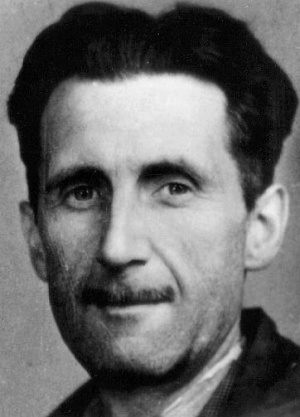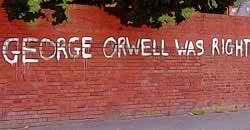George Orwell
( author, journalist, spook) | |
|---|---|
 | |
| Born | Eric Arthur Blair 1903-06-25 Motihari, Bengal Presidency, British India |
| Died | 1950-01-21 (Age 46) University College Hospital, London, England |
Cause of death | |
Resting place | Sutton Courtenay, Oxfordshire, England |
| Nationality | English |
| Citizenship | UK |
| Alma mater | Eton College |
| Children | Richard Horatio Blair |
| Spouse | • Eileen O'Shaughnessy • Sonia Brownell |
| Founder of | Memory hole, Orwellian language |
| Interests | Information Research Department |
Globally acclaimed author whose works include the hauntingly prescient 1984 | |
“No government, no big organization, will pay for the truth. To take a crude example: can you imagine the British Government commissioning E. M. Forster to write A Passage to India? He could only write it because he was not dependent on State aid.”
George Orwell (13 October 1944) [1]
Eric Arthur Blair known by his pen name George Orwell, was an English novelist, essayist, journalist, critic- and spook. His work is marked by lucid prose, awareness of social injustice, opposition to totalitarianism, and commitment to democratic socialism.[2][3][4]
“[A] world in which it is wrong to murder an individual civilian and right to drop a thousand tons of high explosive on a residential area does sometimes make me wonder whether this earth of ours is not a loony bin made use of by some other planet.”
George Orwell (31 December 1943) [5]
Commonly ranked as one of the most influential English writers of the 20th century and as one of the most important chroniclers of English culture of his generation,[6] Orwell wrote literary criticism, poetry, fiction and polemical journalism. He is best known for the dystopian novel Nineteen Eighty-Four (1949) and the allegorical novella Animal Farm (1945). His book Homage to Catalonia (1938), an account of his experiences in the Spanish Civil War, is widely acclaimed, as are his numerous essays on politics, literature, language, and culture. In 2008, The Times ranked him second on a list of "The 50 greatest British writers since 1945".[7]
Contents
Orwellian language
- Full article:
 Orwellian language
Orwellian language
- Full article:
Orwell's work continues to influence popular and political culture, and the term "Orwellian" — descriptive of totalitarian or authoritarian social practices — has entered the language together with several of his neologisms, including "cold war", "Big Brother", "thought police", "Room 101", "doublethink", "newspeak" and "thoughtcrime".[8]
Orwell's Blacklist
In May 1949, George Orwell compiled a blacklist of 38 names[9], which he gave to Celia Kirwan, who worked for the British government’s Information Research Department, an MI6 anti-communist propaganda unit set up for the Cold War. The names included Charlie Chaplin, J. B. Priestley, Michael Redgrave and others, whom Orwell suggested should not be trusted by the IRD as anti-communist propagandists.”[10]
Orwell knew the destination of the list[11], and “was very anxious to keep the list hidden,” adding that “I don’t suppose it will tell your friends anything they don’t know,” and reflecting that, although the IRD probably had tabs on the subjects already, “it isn’t a bad idea to have people who are probably unreliable listed.”[12]
The story first broke in 1996[13]. In 2003 the British government released the document to Timothy Garton Ash[14], a historian who is reliably on the government message, presumably as a reward for good teamwork in other cases.
Publications
George Orwell published many popular novels.
Nineteen Eighty-Four
- Full article: Nineteen Eighty-Four
- Full article: Nineteen Eighty-Four
Nineteen Eighty-Four may be widely considered pre-eminent amongst Orwell's books. Completed in 1948, it was published in June 1949. Perhaps remarkably for such a pessimistic book, it received immediate critical and popular acclaim. The central character, Winston Smith, works in the Ministry of Truth, censoring pieces of history. While charting his failed efforts at resistance, the novel paints a dystopian picture of a totalitarian future in which a tiny elite pursue (the party) pursue a policy of perpetual war and mass surveillance while seeking to exert an ever tighter control over the minds of the proletariat ("the proles").
“The primary aim of modern warfare is to use up the products of the machine without raising the general standard of living.”
George Orwell [15]
One of the central themes is the use of propagandistic language. The book is full of new words (newspeak), which are used to shape the opinions of the proles.
Death
In December 1947 Orwell was diagnosed with tuberculosis. On 21 January 1950, an artery burst in his lungs, killing him at age 46.
Documents by George Orwell
| Title | Document type | Publication date | Subject(s) | Description |
|---|---|---|---|---|
| Document:Politics and the English Language | essay | 1946 | Propaganda Language | |
| File:1984.pdf | book | 1949 | Surveillance State The Great Game Totalitarianism | George Orwell's classic and prescient 1949 dystopian novel about total surveillance in "Oceania", one of the world's then three warring power blocks. |
| File:Animal Farm.pdf | book | Fascism Russian Revolution | A famous allegorical novel about the corruption of revolutionaries and subversion of revolutions. |
Quotes by George Orwell
| Page | Quote | Date | Source |
|---|---|---|---|
| "Hate speech" | “The further a society drifts from truth the more it will hate those who speak it.” | ||
| "Hate speech" | “If liberty means anything at all, it means the right to tell people what they do not want to hear.” | ||
| "Iraq/WMD" | “Every war when it comes, or before it comes, is represented not as a war but as an act of self-defense against a homicidal maniac.” | ||
| Corporate media/Mendacity | “Early in life I have noticed that no event is ever correctly reported in a newspaper.” | 1943 | Looking Back on the Spanish War |
| Freedom of speech | “Take away freedom of speech, and the creative faculties dry up.” | 28 April 1944 | The Tribune |
| Mind control | “Power is in tearing human minds to pieces and putting them together again in new shapes of your choosing.” | 1948 | Nineteen Eighty-Four |
| Plastic word | “In certain kinds of writing, particularly in art criticism and literary criticism, it is normal to come across long passages which are almost completely lacking in meaning. Words like romantic, plastic, values, human, dead, sentimental, natural, vitality, as used in art criticism, are strictly meaningless, in the sense that they not only do not point to any discoverable object, but are hardly ever expected to do so by the reader. When one critic writes, ‘The outstanding feature of Mr. X's work is its living quality’, while another writes, ‘The immediately striking thing about Mr. X's work is its peculiar deadness’, the reader accepts this as a simple difference opinion. If words like black and white were involved, instead of the jargon words dead and living, he would see at once that language was being used in an improper way. Many political words are similarly abused. The word Fascism has now no meaning except in so far as it signifies ‘something not desirable’. The words democracy, socialism, freedom, patriotic, realistic, justice have each of them several different meanings which cannot be reconciled with one another. In the case of a word like democracy, not only is there no agreed definition, but the attempt to make one is resisted from all sides. It is almost universally felt that when we call a country democratic we are praising it: consequently the defenders of every kind of regime claim that it is a democracy, and fear that they might have to stop using that word if it were tied down to any one meaning. Words of this kind are often used in a consciously dishonest way. That is, the person who uses them has his own private definition, but allows his hearer to think he means something quite different. Statements like Marshal Petain was a true patriot, The Soviet press is the freest in the world, The Catholic Church is opposed to persecution, are almost always made with intent to deceive. Other words used in variable meanings, in most cases more or less dishonestly, are: class, totalitarian, science, progressive, reactionary, bourgeois, equality.” | 1946 | Politics and the English Language |
| Totalitarianism | “Totalitarianism, however, does not so much promise an age of faith as an age of schizophrenia. A society becomes totalitarian when its structure becomes flagrantly artificial: that is, when its ruling class has lost its function but succeeds in clinging to power by force or fraud. Such a society, no matter how long it persists, can never afford to become either tolerant or intellectually stable. It can never permit either the truthful recording of facts or the emotional sincerity that literary creation demands.” | 1946 | |
| War | “The primary aim of modern warfare is to use up the products of the machine without raising the general standard of living.” | Nineteen Eighty-Four |
Related Document
| Title | Type | Publication date | Author(s) | Description |
|---|---|---|---|---|
| File:GeorgeOrwellSpecialBranchFile.pdf | Police file | July 2012 | UK Special Branch | The UK Metropolitan Police Special Branch file on Eric Arthur Blair (George Orwell) |
References
- ↑ http://alexpeak.com/twr/orwell/quotes/ The Tribune
- ↑ "Why I Write" in The Collected Essays, Journalism and Letters of George Orwell Volume 1 – An Age Like This 1945–1950 p.23 (Penguin)
- ↑ https://www.pbs.org/thinktank/transcript990.html quote=Every line of serious work that I have written since 1936 has been written, directly or indirectly, against totalitarianism and for democratic socialism, as I understand it. [italics from printed source]
- ↑ http://www.ucl.ac.uk/Library/special-coll/orwell.shtml
- ↑ http://alexpeak.com/twr/orwell/quotes/ As I please Tribune
- ↑ http://www.economist.com/displayStory.cfm?source=hptextfeature&story_id=11826680
- ↑ http://www.thetimes.co.uk/tto/arts/books/article2452094.ece
- ↑ http://www.guardian.co.uk/books/2009/may/10/1984-george-orwell
- ↑ https://www.spyculture.com/orwells-list/
- ↑ https://bennorton.com/george-orwell-list-leftists-snitch-british-government/
- ↑ https://www.mhpbooks.com/the-fable-of-the-weasel-by-alexander-cockburn/
- ↑ https://www.mhpbooks.com/the-fable-of-the-weasel-by-alexander-cockburn/
- ↑ http://www.writing.upenn.edu/~afilreis/50s/orwell-informer.html
- ↑ https://www.theguardian.com/uk/2003/jul/10/past.freedomofinformation
- ↑ https://melbournepress.com/2017/05/08/georgia-orwells-warning/ Nineteen Eighty-Four
Wikipedia is not affiliated with Wikispooks. Original page source here

